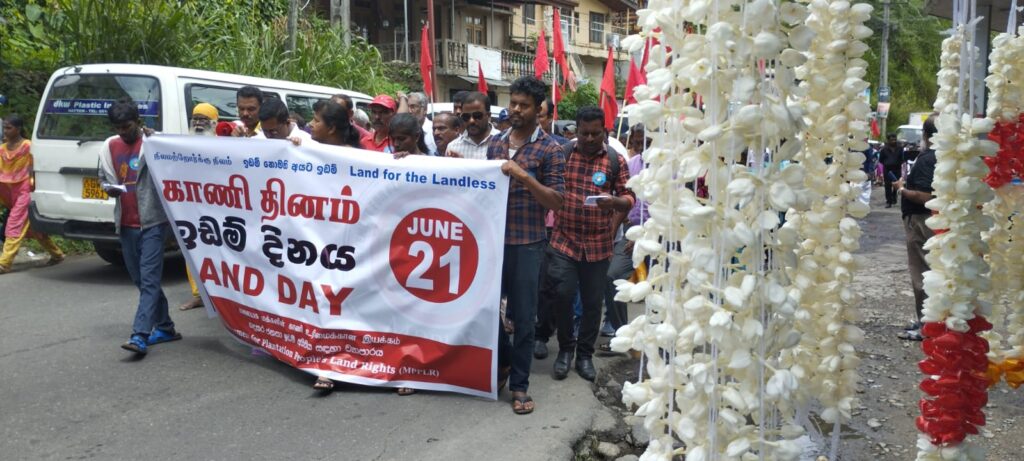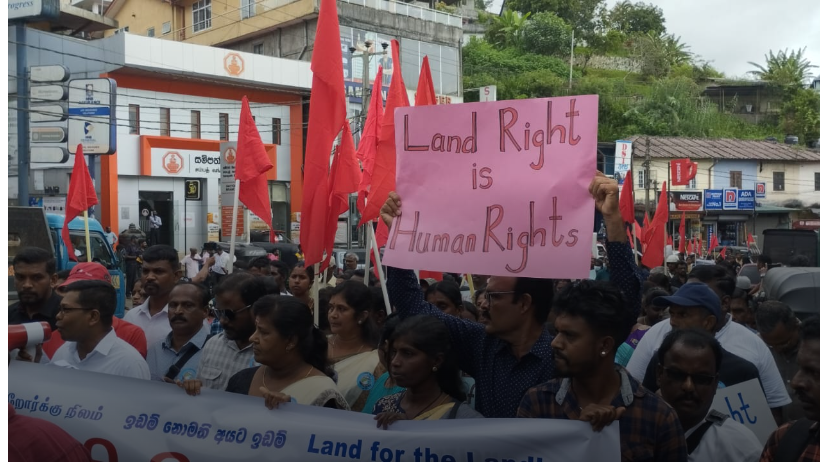
Image courtesy of thetime.lk
The Malayaha Tamil community held a protest last month to mark 77 years since a mass strike in 1946 when up to 500,000 plantation workers participated in a mass strike against land grabbing in Kegalle, Bulathkopitiya, in the Urulovaliya plantation.
The Malayaha Tamil community has been advocating for land rights as part of their broader demands for equal rights. Over the past few years, the movement has gained momentum, with various activists, NGOs, and CSOs joining in support. At the forefront of this movement is the Movement for Plantation People's Land Rights (MPPLR), which has been active for about 18 years but has seen increased participation from organisations in the south in the past 5 to 6 years.
The primary objectives of claiming land rights for the Malayaha Tamil community include securing land for housing and agriculture. They are demanding 20 perches of land with a deed to build houses and 2 acres of land for agricultural purposes. These demands aim to provide the community with a sense of security, economic stability, and, most importantly, dignity.
However, several barriers have been presented by stakeholders such as regional plantation corporations (RPCs) and the state. Social stigma, political issues, and economic complications, hinder the realisation of land rights.
Speaking to Tamil Guardian, Vijay Madasamy, a Malayaha Tamil activist said:
“Social stigma arises from the belief among some Sinhala people, particularly those in Kandy, that the land rightfully belongs to them, which was taken during the British colonial period when the plantations were established. Overcoming this stigma requires reeducation and awareness that these narratives are produced by nationalist rhetoric.”
Political issues arise at both the regional and national levels. Madasamy said, “We have to examine the political will of the parties and unions that function in the Malaiyaha Tamil region to support land rights as a way to address the socio-economic needs of the community. These demands will allow the workers to move out of the structure of the plantation economy and challenge the hegemony of plantation unions.”

Image courtesy of thetime.lk
On the national level, the Sinhala-Buddhist majoritarian state has historically been reluctant to provide the basic rights of the community. From the Ceylon Citizenship Act, which disenfranchised the community, to the Sirima - Shastri pact and the Sirima - Gandhi pact repeatedly denied full citizenship to the Malaiyaha Tamil community by forcibly repatriating them to India. It wasn’t until 2003 were Malayaha Tamils granted franchise and granted full citizenship.
“Knowing this history it is highly unlikely that the state will be proactive in meeting our demands regarding land rights,” Madasamy told Tamil Guardian.
Economic reasons are also cited as barriers to land rights. There is a fear that granting land rights to the Malayaha Tamil community could disrupt the production of tea and rubber, which are the major exports for Sri Lanka. However, the community counters this rhetoric by advocating for alternative production methods, such as smallholder plantations. The obvious advantages of the state to align themselves with the regional plantation companies have led successive governments to be pressured by the state to prevent reforms that may affect their profits.
The response from the government and state has been inadequate thus far. Land-related reforms have been promised during election cycles, but the demands of the Malayaha Tamil community are rarely addressed beyond these periods. Previous programs focused on providing houses, such as two-story houses in line houses during Chandrika Bandaranaike tenure as President; Under the 'Good Governance' government, the community was promised 7 perches of land. However, these programs did not address the community's agricultural development needs, perpetuating their dependence on the plantation sector.
Vijay Madasamy emphasises that land rights are the foundation for the community's emancipation. By securing land, they aim to move away from line houses and live with dignity. The demand for 2 acres of land for agricultural development is crucial for breaking free from the plantation sector's exploitative conditions. The community aspires to follow the model of smallholder plantations, which has proved to be a successful model. Smallholder plantations in the south have been able to grow tea and rubber within 50 - 80 perches of land. Owners of these lands have also been able to cultivate fruits, vegetables, and yams for their own consumption. Additionally this model has shown increased productivity benefitting both the workers and has also been the biggest contributor of tea production in the whole island. Smallholder plantations also encourage crop diversity, which has ensured the integrity of the soil over longer periods of time.
The Malayaha Tamil community sees land rights as a stepping stone towards accessing basic services provided by the state, including water, electricity, postal services, education, and healthcare. Currently, their lack of addresses in line houses complicates basic tasks such as receiving letters. Access to schools, medical services, and government-related services would be significantly improved with land rights.
As the movement continues, the Malayaha Tamil community emphasises the importance of land rights as a means to achieve dignity, economic stability, and autonomy. By addressing the barriers and negotiating with stakeholders, they hope to realise their demands and create a path towards a more equitable future.
We need your support
Sri Lanka is one of the most dangerous places in the world to be a journalist. Tamil journalists are particularly at threat, with at least 41 media workers known to have been killed by the Sri Lankan state or its paramilitaries during and after the armed conflict.
Despite the risks, our team on the ground remain committed to providing detailed and accurate reporting of developments in the Tamil homeland, across the island and around the world, as well as providing expert analysis and insight from the Tamil point of view
We need your support in keeping our journalism going. Support our work today.
For more ways to donate visit https://donate.tamilguardian.com.

